1. act or effect of repudiating.
2. act of repelling; non-acceptance, rejection.
There was a time when institutional repudiation notes used to generate some social repercussion. After all, they basically mean that a certain organization does not accept or reject a certain attitude, or decision, coming from another political, economic or social sphere.
However, times have changed. In fact, we've reached an age of anomalies and these notes have lost whatever value they once had, basically becoming mere pompous and formal letters that signal nothing but a mix of disgust or revolt from a part of the society — It has become a mere visual impact with low practical potential, since they do not prevent the absurd from happening, much less prevent people from committing atrocities. And they don't prevent authorities, for example, from adopting denialism in the face of a global pandemic.
It is based on this arduous dystopian reality that the satirical revolt represented in Pulling No Punches is born.
Channeling your anger in a creative way

Pulling No Punches is a 2D Beat 'em Up style game inspired by the classic arcade games of the 90s, where up to four players can team up to solve the problem of denialism of a fictional pandemic with their own fists, and it's available in English and Brazilian Portuguese on Steam and Itch.io for US$10 and with relatively simple requirements: 6GB of RAM, 4GB of disk space and a dedicated GPU.
Produced by Braindead Broccoli, the game was created through crowdfunding between April and May 2021, which raised more than US$ 10,000 - guaranteeing all the goals set by the project, which promises to launch the game also on PlayStation 4, Mac, Xbox One and Nintendo Switch.
Four characters with different play styles
The game tells the story of a city ravaged by a deadly virus that has driven all citizens into social isolation. But, due to disinformation from a fanatical group, many began to ignore the dangers and even sabotage protection measures in favor of profit and propagating the lie of a false cure.
Tired of dealing with mass-cult ignorance and disrespect for other people's lives, four young adults unite to fight denialism - with their own punches.
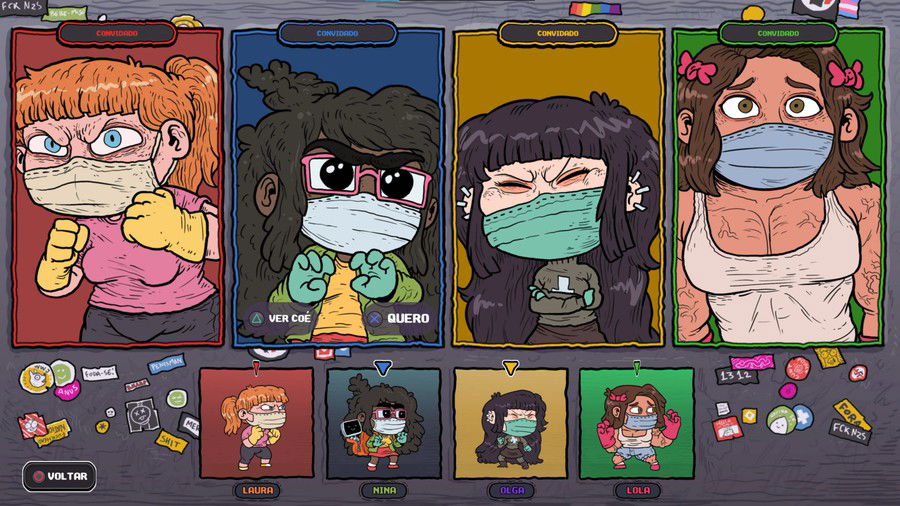
With up to four-players, each one can choose one of four available characters: Laura, Nina, Olga and Lola — each with distinct abilities and gameplay styles that let the player decide how they prefer to enjoy the game and adds an extra layer of replayability in a single player mode.
Laura is the character with the most balanced stats and doesn't specialize in any of them, making her the "safer" option for new players, while Nina has a higher reach with her robot companion, but they don't deal as much damage.
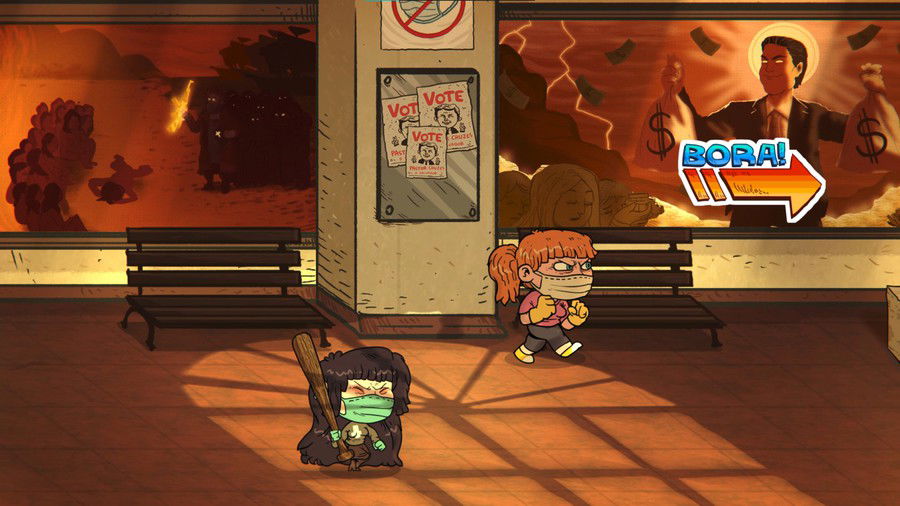
Olga is the fastest of the four characters and has a better cadence for her attacks, but she also lacks a bit of damage and range, often forcing her to fight closer to her enemies than you'd like. Lola, as her own physical trait demonstrates, is totally focused on brute force in exchange for speed, becoming the slowest of the team, but the one that causes the most damage among the four.
If that wasn't enough, each of the characters can, in each stage, find some torn books that, when completed, teach them new moves and attacks such as kicking, sweeping, dodging, rolling, among others that hone your combat skills and increase your options for dealing with the more than 30 different enemies spread across the game's four stages.
Gameplay
As soon as you start the game, it asks which difficulty level you prefer to play at: on normal, you'll see more items being distributed around the levels, while the harder level makes this distribution practically sparse.
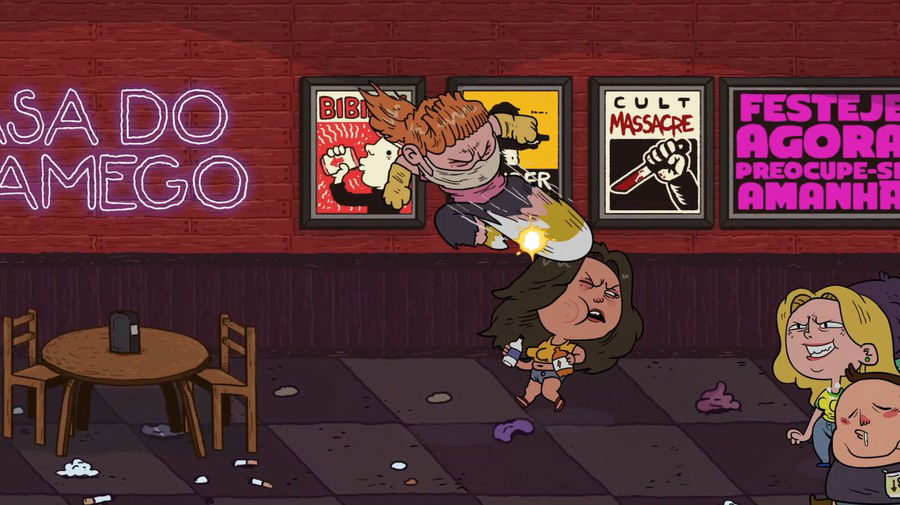
Pulling No Punches' gameplay is pretty straightforward: each level is basically composed of the same structure: walking around the streets beating up some mobs and earning coins when they are defeated, crushing boxes and trash cans searching for alcohol gel (which heals your health bar), masks (which give you extra lives) or torn books and head to a dungeon where a disinformation spreader is.
The buttons are easy to memorize after a few tries, as they each do a different action: light attack, strong attack, jump, defend, grapple and a combination of them performs other skills you learn from books. You can also pick up items left on the ground, such as glass bottles to throw at an enemy, or a nail bat to deal more damage to them, but each of these artifacts has limited durability and falls apart after a few attacks.
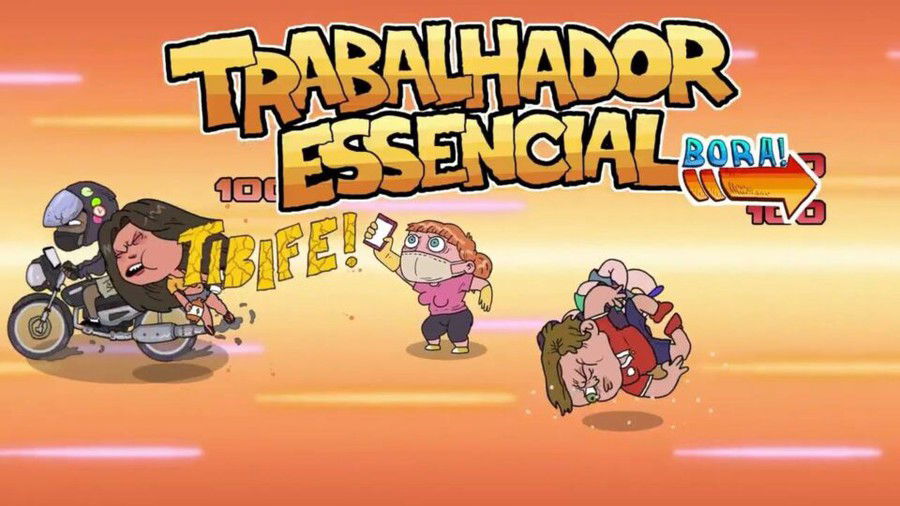
Each character also has a bar that increases as you knock out your enemies, and when it fills up, you can press one of the buttons to perform a special attack based on some prevention measure - such as Social Distancing or Home Office - dealing damage or even knocking out all opponents on the screen, and I recommend using it whenever it seems necessary in each situation rather than trying to save it for the boss, as you will have many more opportunities to fill it out again.
Pulling No Punches also has some layers of strategy, as with over 30 different enemies scattered around the campaign, there is a need to read their movement patterns and understand which attack or moment is best suited to fight them: some are easier and can be knocked out by literally any punch or kick, while others block your attacks and need to be grappled to the ground, and there are those that are too heavy to grapple, those that have attacks that cannot be blocked, those that attack from a distance, etc.
However, one of the crucial issues I've encountered during my experience of the game is that the commands execution and the timing of attacks is noticeably less responsive with some characters and opens up numerous gaps for mobs to attack you and nullify your movement, which can be considered as challenging, but also as frustrating for some players.
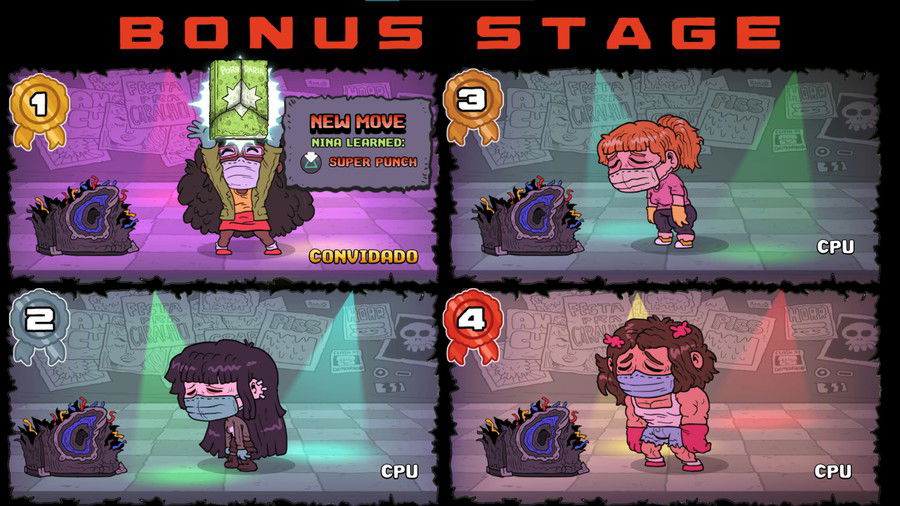
At the end of each stage, you go through a bonus stage where you have to frantically press the attack button to break something before the other four players or the CPU, and the first two that finish receive a bonus in coins, or even a new book to learn another skill.
Coins are used to purchase items from street vendors existing on the map between one stage and another - more necessarily food and drink - that can be consumed to increase some specific stat, such as accelerating the special bar, or increasing the damage you can deal in exchange for also taking more damage, etc. They get more expensive as you progress through the game, but they aren't mandatory elements for your progress, at least at the normal level.
Another problem that I encountered during my gameplay was in relation to the pause menu while I was on the map: it only worked after spending some time waiting there, and it proved to be a huge issue, considering that it is through this menu that you have access to the possibility of switching of characters, among other resources.
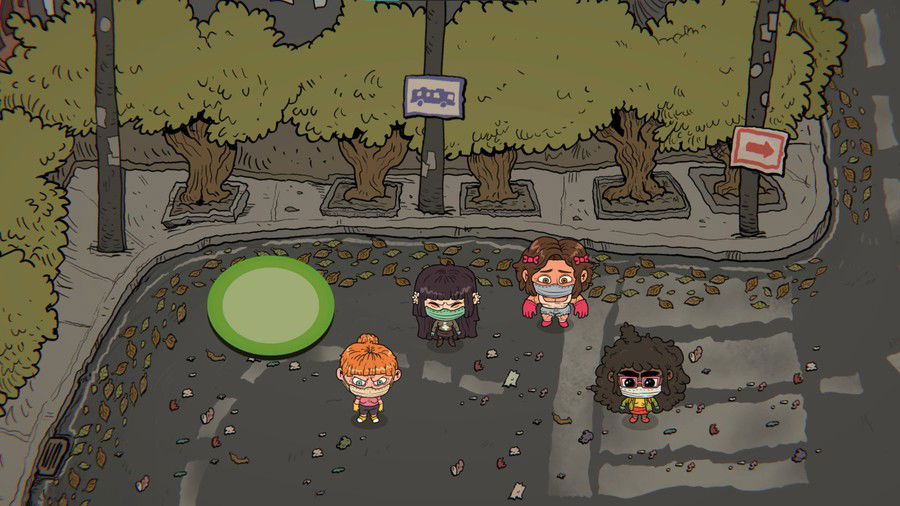
Finally, another important point is that the game's campaign is short, and you'll finish it on a first run with around an hour or two. But as each character has its own skill set to be learned and each one offers a different experience, there is a lot to reuse when you close the game for the first time, which is further reinforced by the challenges that can be accomplished in each phase, such as total of combos performed, time goal to reach the end of the stage, times your character was killed, among other details that guarantee achievements and trophies, significantly expand the useful time of the game.
Made in Brazil
Both the protagonists and the enemies are well-designed, their movements are fluid and look completely natural, and although some of them get too caricatured when executing an attack, this correlates well with the game's proposal to bring as much of a Brazilian-stylized satirical dystopia as possible.
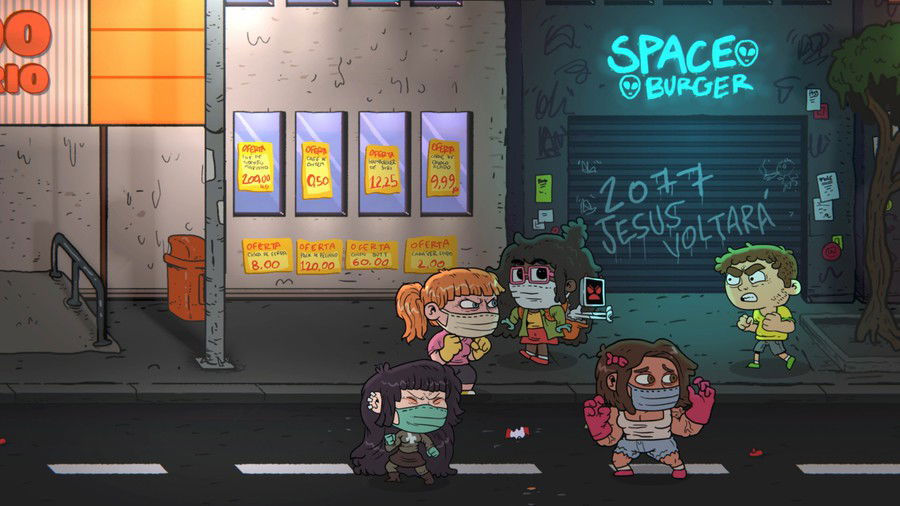
This element is also seen in the design of each of the stages, rich in details and Brazilian easter eggs, ranging from the famous graffiti that exist in large cities of a prophetic year in which Jesus will return, to other famous memes such as Michael Douglas (which became popular after a song with the actor's name), and even something as simple as a poster on the wall alludes to some part of the Brazilian humor on the Internet.
The soundtrack also carries strong roots in contemporary Brazilian culture by bringing some of the best known beats and rhythms today in an 8-Bit version. It's not the most elaborate thing in the world, but definitely fits as fun, and serves its purpose well in the game's atmosphere.
A game about responsibility, politics and anger
The truth is that it is simply impossible to analyze Pulling No Punches without considering its political role. After all, every game with a minimum of plot carries with it a story to be interpreted and a message that is up to the player to decode, and Braindead Broccoli doesn't care to leave in the shadows what the message of this title is: a literal punch filled with revolt against a fanatical group that misinforms about serious issues and promotes denialism.
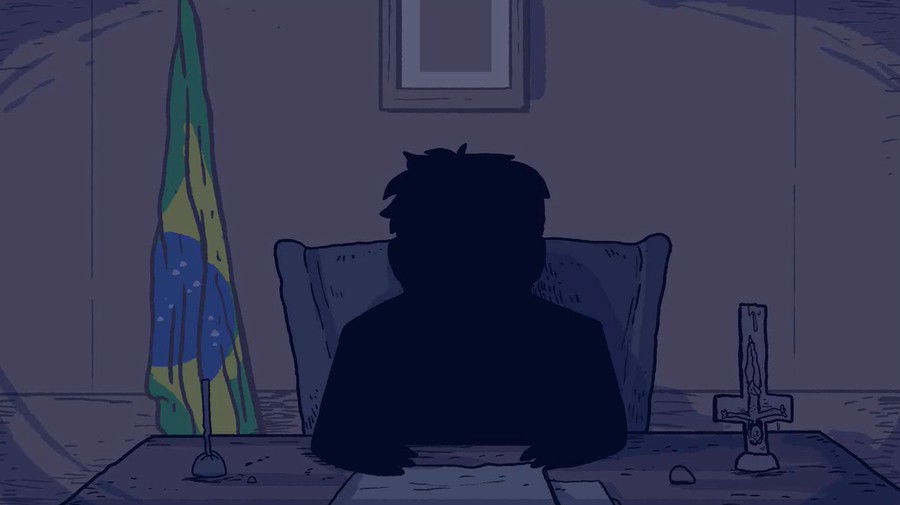
Its story portrays the satire of a dystopian city where religion and politics have ignored a lethal disease and promoted a false cure that kills people while sabotaging any efforts to contain the virus — not unlike the cruel reality of the pandemic that has plagued Brazil and the world during 2020 and 2021 — and at no time does its creators try any other approach that is not based on the scandals we experienced.
During isolation, I remember reading an article in a foreign newspaper that mentioned how our relations with others would never be the same after the pandemic, that the divisions generated by isolation, denialism and political positions that support or leave of supporting certain protective measures would make us see each other in an entirely different light. In the end, we would come to feel anger and contempt for some, while we would have more respect or admiration for others based on our conduct and their conduct towards a global crisis as per our own perception of individual care and a being's collective responsibility - The conflict between "I want" versus "We need" has never been so wide open over the years.
And the truth is that our relationships with others, in fact, were never the same, and Pulling No Punches was founded precisely from this anger or contempt that people have come to cultivate towards those who made decisions with an absence of any care about each other or their own families - and it delivers just what it promised: the anger and frustration experienced during those times and the desire to actively act against human stupidity channeled into the form of entertainment.
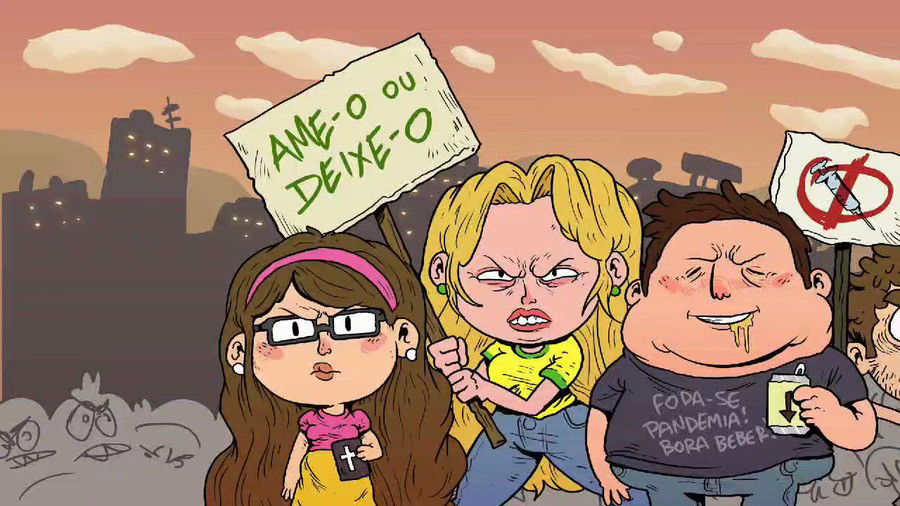
With several posters and other messages spread around every detail and through an aggressive verbal language, the title communicates incredibly well with its target audience and hit the nail on the head to convey its message and against what its authors oppose, reaching to the point where they don't even have to care whether their words seem offensive or not to certain groups because, if you identify with any opponent in the game and consider the message conveyed as bad, they actually want you to be offended.
Although this may alienate an audience with little interest in seeing local politics represented in the games, the studio also seems to make it clear that it doesn't care about meeting the wishes of these players and, honestly, it doesn't even seem to need to, since it communicates so well with their audience and still captures the attention of many people who just want a fun and relaxed game for cheap.
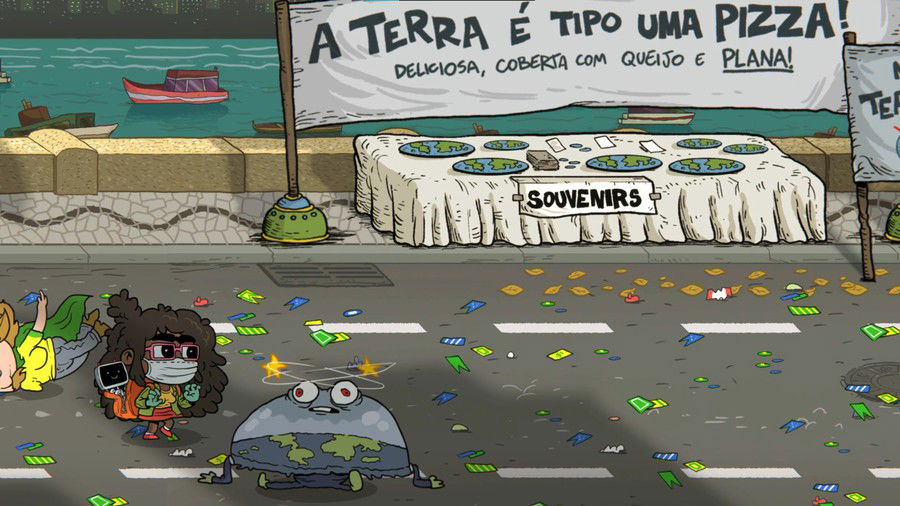
The only thing that partially bothers me about Pulling No Punches is how often it feels like a 2000s New Metal album: it's all about anger, and it's only about anger. All of its language is made up of aggressive and pejorative terms in an extremely simplistic way, bringing little or no rationality to the "why are we punching these people" beyond the obvious answer "they are putting others at risk. So, they are despicable" — the game lacks reflection and communication that can actually move the player and bring a little more substance to the plot.
The exception is the cutscene at the end of the journey, where the authors reflect that abnormal times won't magically disappear. Even when the greatest evil is defeated, the feeling of seeing a scorched earth remains, and it is still necessary to deal with many remnants and irreparable losses from the dark times. But, perhaps with a gradual reconstruction, it might be possible that one day we will see the sun rise on the horizon of what we used to know and call "normal" in our lives - a simple and clear message in the face of uncertain times.
Where to download the game
You can download the game from this link here. It is available on Steam and Itch.io for $10 on August 16, 2022.
There is also the free Demo version of the game, which can be found here.
Gameplay trailer
Conclusion
Pros
> Easily memorable gameplay.
> Very well designed 2D environment with movements that looks incredibly natural.
> Plenty of replayability as it has with four different characters to play and several challenges to fulfill.
> A great marketing strategy that knows very well how to cater to its target audience's desires, giving them exactly what they promised - a way to channel their anger at a bad social and political situation through entertainment.
Cons
> Attacks' timing fluctuates a lot from one character to another.
> Minor bugs in the map pause menu make it difficult to transition between characters in single-player mode.
> The plot feels like a 2000s New Metal album as it fills the players' collective feeling towards villains, but lacks any substance that goes beyond anger.
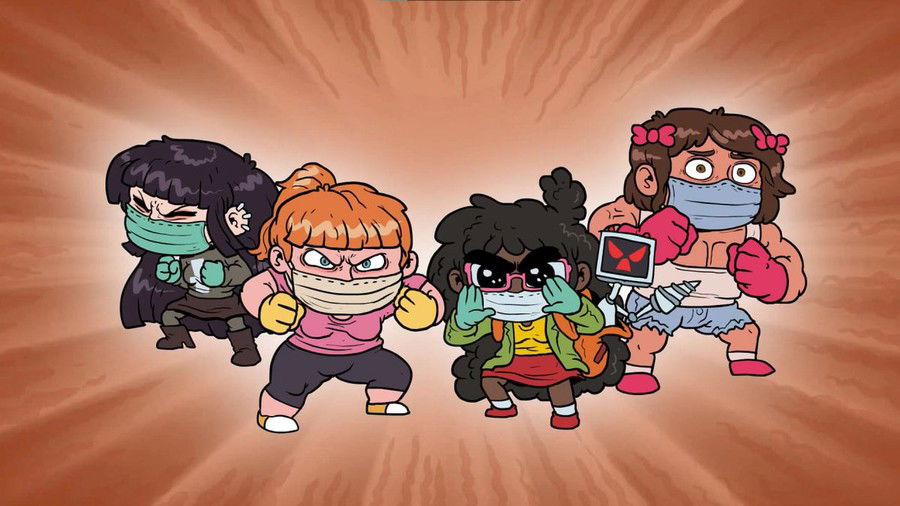
Pulling No Punches is a 100% Brazilian game with good gameplay and a relevant political and social message that expresses a collective revolt from the pandemic times. It manages to bring the best of Beat 'em Up classics to our reality and offers a fun experience to play alone or with others.







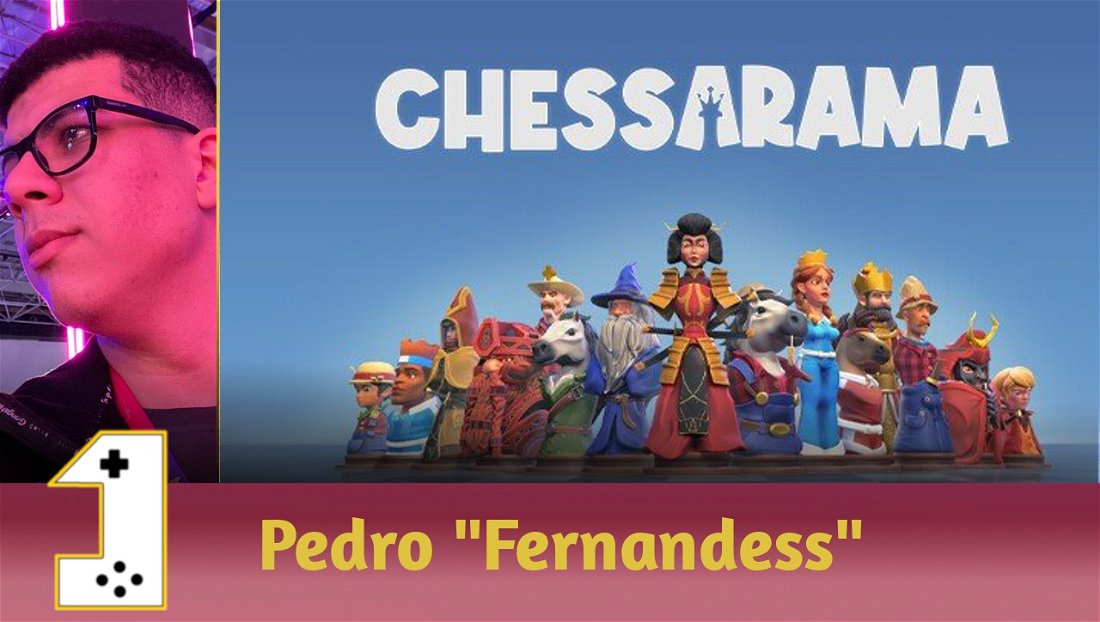



— Комментарии 0
, Реакции 1
Прокомментируйте первым